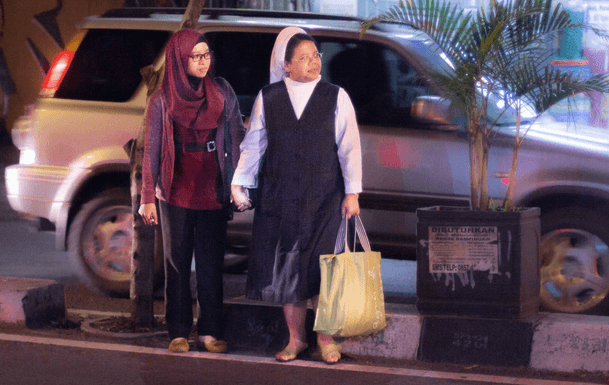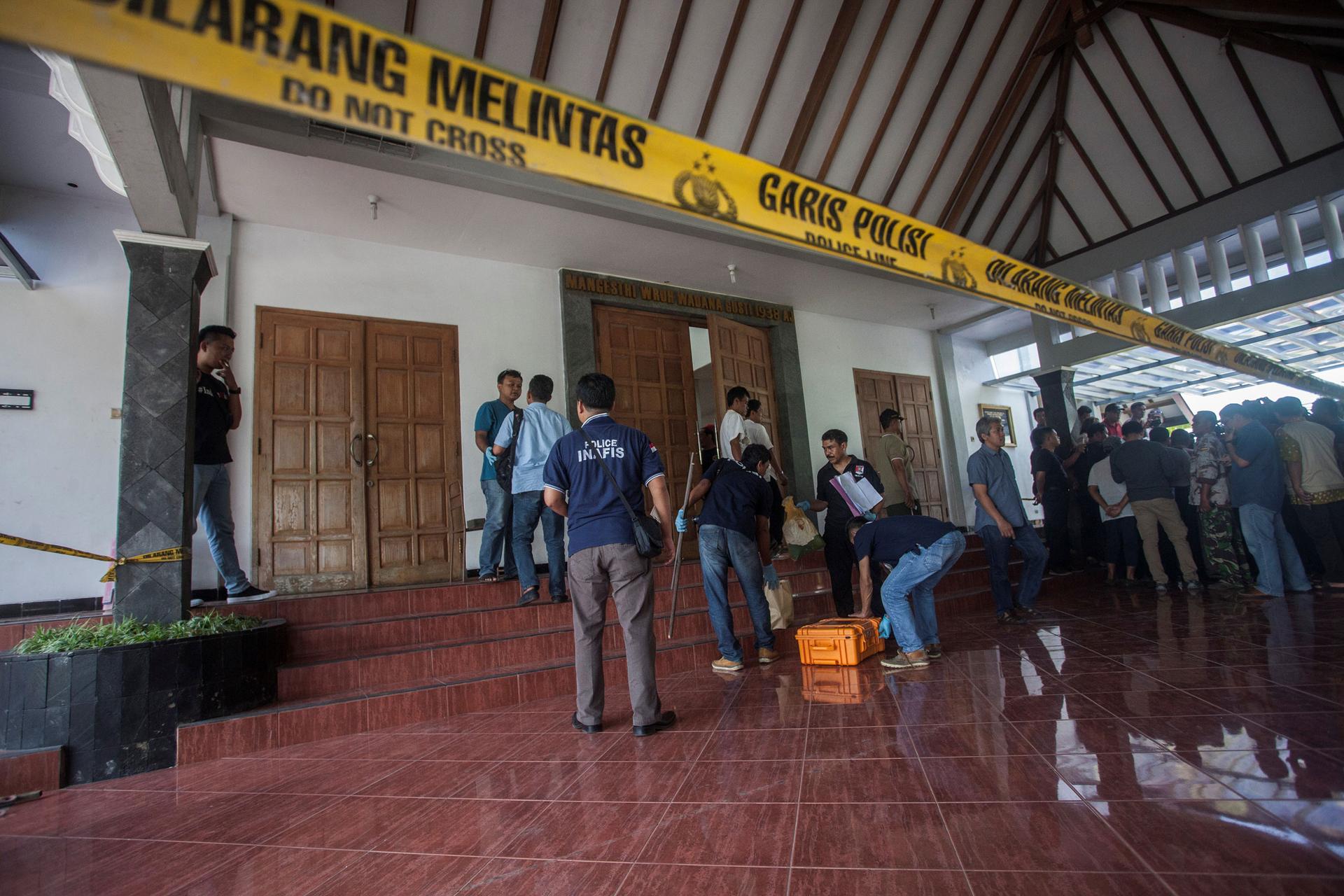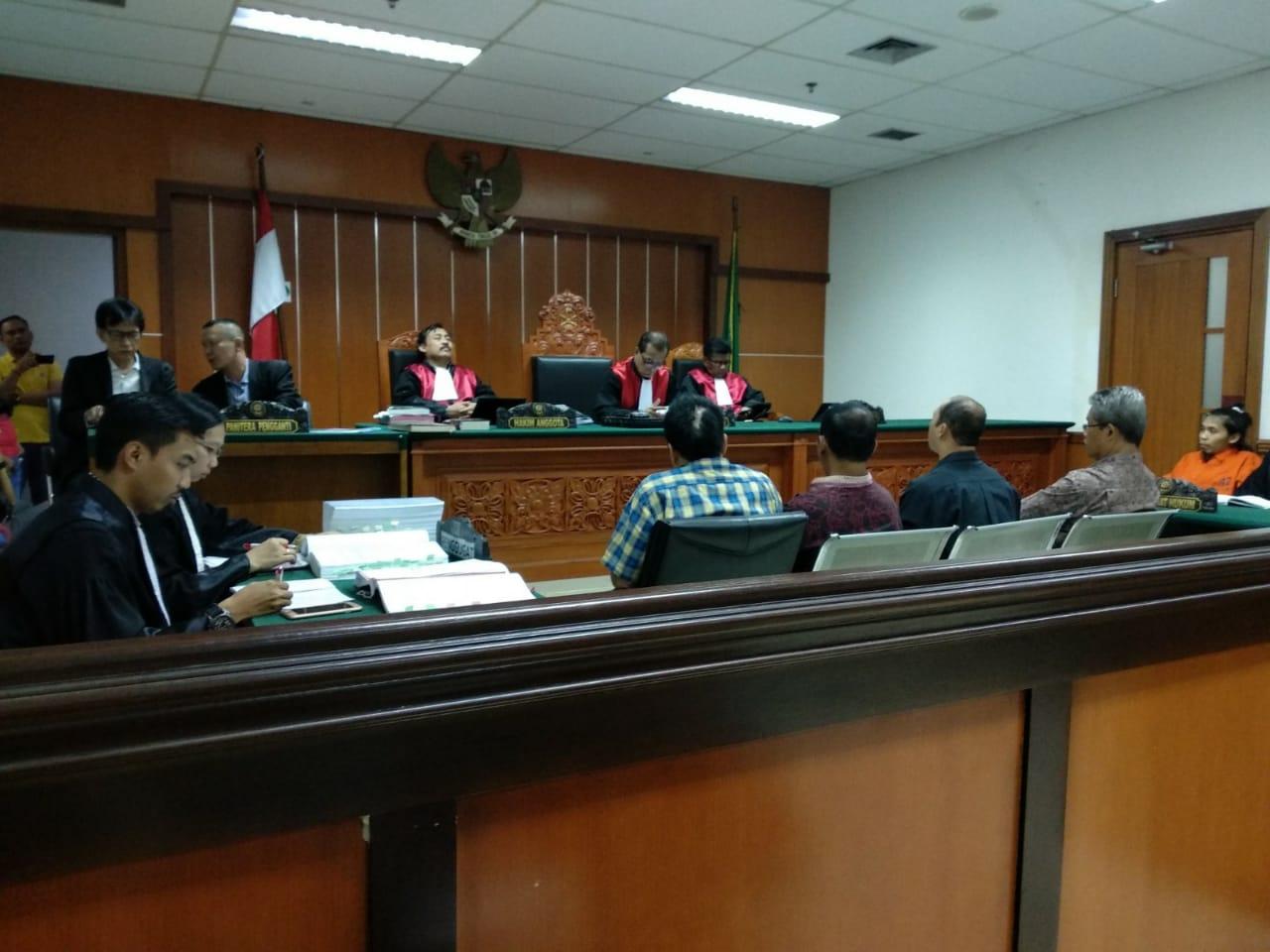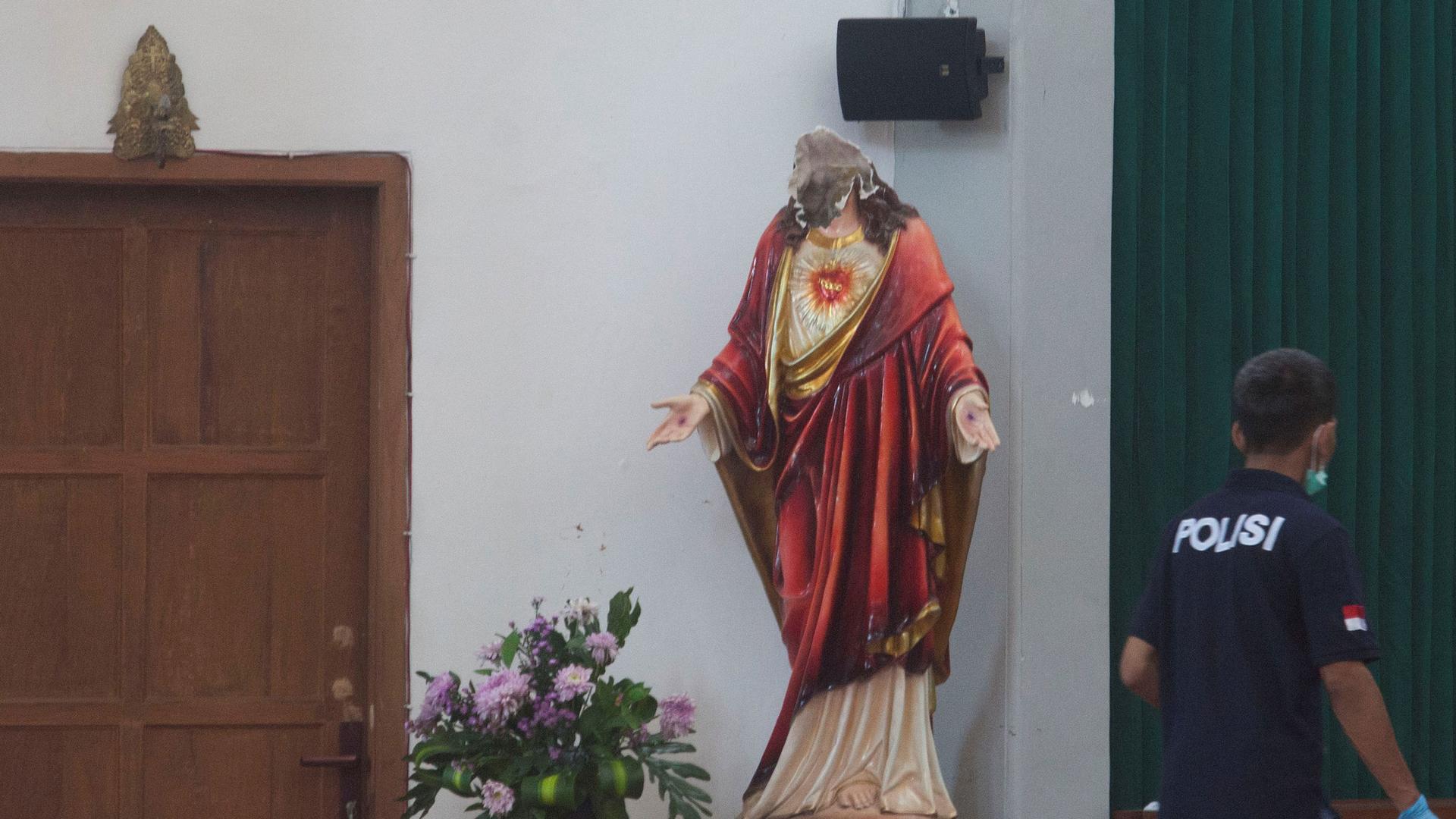This region of Indonesia was known for its religious harmony. Now, Catholics face growing intolerance.
A police investigator is seen inside the Lidwina Catholic Church after a knife-wielding attacker wounded four churchgoers in Sleman, Yogyakarta, Indonesia.
The city of Yogyakarta, Indonesia, was once the “poster child” of pluralism where Muslims and Catholics lived in religious harmony. But recently, that notion has changed as hardline Muslim “pressure groups” have become more active in the area.
The Front Jihad Islam (FJI) and Islamic Defenders Front (FPI) are both religious-based “pressure groups” that operate in the greater Special Region of Yogyakarta, promoting anti-vice and anti-apostasy messages. Both the FPI and FJI are considered religious vigilante groups, but FJI is very active in Yogyakarta while FPI maintains a nationwide network.
Related: Indonesia’s Muslim youth find new heroes in Instagram preachers

Despite repeated calls from Sultan Hamengkubuwono X, who is also the governor of Yogyakarta, to uphold religious freedom, incidents of religious intolerance are on the rise in Yogyakarta — from contested burial grounds to a Catholic church attack prosecuted as terrorism.
SETARA Institute for Democracy and Peace, an Indonesian human rights think tank, placed Yogyakarta Province among the least-tolerant cities on its 2017 Tolerant Cities Index.
The think tank has been documenting and reporting the state of religious freedom in Indonesia since 2007.
“…[The] rising intolerance in Yogyakarta isn’t an isolated phenomenon — there are clear indications that the province suffers from rising religious exclusivism, especially in areas where hardline Muslim organizations such as FPI and FJI are present.”
Tigor Bonar Naipospos, vice president of SETARA Institute, says “[the] rising intolerance in Yogyakarta isn’t an isolated phenomenon — there are clear indications that the province suffers from rising religious exclusivism, especially in areas where hardline Muslim organizations such as FPI and FJI are present.”
Several incidences of intolerance in Yogyakarta are linked to FJI, including assaulting a man for holding Rosary beads in his house in 2014, dispersing a Christian school Bible camp in 2015, and pressuring the local government to shut down a transgender Quranic boarding school in 2016.
One of FJI Yogyakarta’s central figures, Abdul Rohman, supports Abu Bakar Basyir, the spiritual leader of Jemaah Islamiyah, credited by hundreds of Islamic militants as a “jihad inspirator.” Rohman invited Basyir to give a sermon and his blessings at the group’s official launch in 2006.
Related: The world’s largest Islamic group wants Muslims to stop saying ‘infidel’
Mohammad Iqbal Ahnaf, a faculty member at the Center for Religious and Crosscultural Studies (CRCS) Universitas Gadjah Mada Yogyakarta, says Yogyakarta has a “vigilante groups issue combined with an authority issue,” leaving longtime Catholic and Muslim communities to wrestle with how to cope with the rising tide of intolerance.
An attack on faith
In February 2018, an unknown man armed with a katana burst into Saint Lidwina Church Bedog in Sleman, one of Yogyakarta’s four districts, during Sunday morning Mass, prompting congregation members to flee.
The man attacked and badly injured Father Karl Edmund Prier, along with a few other members of the congregation who tried to protect the priest. The assailant slashed bibles and decapitated statues of Mary and Jesus. After ignoring warning shots from police, they subdued him with two bullets. One police officer was also injured.
Yogya police later identified the man as Suliono, 23, who came to Yogyakarta to study the Quran from Banyuwangi, a small town in East Java.

In response to the attack, Bernadetta Aryanti, an independent psychologist and a member of Saint Lidwina Church, volunteered to give psychological assistance and support.
“I received a lot of calls from those who suffered fear and anxieties after the attack, so I took the initiative and told my pastor that I want to volunteer in assisting them. Ever since, I received calls from my friends and colleagues who also wish to assist the chapelry,” Aryanti said.
She also worked collectively with dozens of other psychologists to provide psychological assistance some 200 Saint Lidwina members.
“The trauma healing process was hard. It was intended as an 8-day program, but later on, continued for over a year. … Those [who] were wounded during the ordeal have … healed, but psychological healing is a different story.”
“The trauma healing process was hard. It was intended as an 8-day program, but later on, continued for over a year. … Those [who] were wounded during the ordeal have … healed, but psychological healing is a different story,” Aryanti said. She notes that the attack especially affected children, who reported nightmares, the inability to concentrate on studies and fears of returning to the church.
Aryanti attended a few court sessions in Jakarta and observed Suliono’s behavior. She says he confessed, through his lawyer, to decapitating statues because his religion forbids idolatry. Aryanti believes forgiveness is an important key to traumatic healing and that Suliono’s lack of remorse stifled the process for victims.
Related: Mobile technology for Muslims is changing faith in Indonesia
The Roman Catholic Archdiocese of Semarang also called on lawyers to assist through the Justice, Peace and Integrity of Creation — part of the Archdiocese of Semarang that deals with justice and advocacy for Indonesian Catholics.
“I advised the lead pastor to file a terrorism charge. I don’t normally challenge the authorities, but to call it an assault [was] an understatement.”
Anastasia Suki, a Yogyakarta lawyer, was appointed to lead the defense team for the survivors and witnesses of the attack. “I advised the lead pastor to file a terrorism charge. I don’t normally challenge the authorities, but to call it an assault [was] an understatement,” told Suki to The World in a phone interview.
According to police, Suliono used to live in Poso, Central Sulawesi, a region known for sectarian clashes and as the basecamp for the East Indonesia Mujaheed group, loyal to ISIS. Suliono attempted to join ISIS in Syria but failed to obtain a passport, according to Inspector General Setyo Wasisto from the Indonesian Police to the media. Suliono’s court and police findings show that he had two noms de guerre: Nang Ibrahim al-Maduri and Abdullah Ibrahim al-Jogjawi, both names police say he planned to use in Syria, to fight along ISIS.
However, it remains unclear if Suliono belonged to a local radical or terrorist group. Indonesian police ultimately declared him a “lone wolf,” but Suki believes that online extremist materials and networks might have contributed to his radicalization.
“[In] court, he claimed that he loves watching Islamic lectures on Youtube as well as combat training videos,” Suki said.
In October 2018, Suliono received a 15-year jail sentence for violating Indonesian law No. 15/2003 on terrorism.

Burial grounds discrimination
When 62-year-old Albertus Slamet Sugihardi passed away suddenly in December 2018, his neighbors quickly helped his grief-stricken widow prepare his funeral. But where he was buried became a hotly contested issue in Kotagede, a subdistrict in Yogyakarta, where Muslims make up the majority.
Villagers remembered Sugihardi, a Catholic, as a kind neighbor willing to lend a helping hand. But Muslim village elders argued that Jambon Cemetery, where Sugihardi would be buried, is for Muslims — and a non-Muslim had never been buried there before.
Kotagede was once the cradle of the Mataram Sultanate, an independent Islamic kingdom that later split into the Sultanate of Yogyakarta and the Sultanate of Surakarta under Dutch rule. In the last decade, only 7.5% of residents of Yogyakarta Province identify as Catholics and Christian Protestants, according to the 2010 Indonesian Census.
Jambon Cemetery is technically a public cemetery where any villager — regardless of religious affiliation — can be buried. But community elders decided “by oral consensus by the locals that the cemetery is a Muslim cemetery.”
So, the elders asked Sugihardi’s wife to sign a consent letter granting permission to saw off Sugihardi’s wooden cross grave marker, so he could claim his final resting place. In a haze of grief, she signed their printed letter.
The elders also asked Sugihardi’s family not to anger the villagers by performing the Catholic final rites at their house or cemetery.
According to Cyprianus Lilik Krismantoro, JPIC secretary, acts of intolerance like Sugihardi’s family confronted in Yogyakarta can be minimized but impossible to eliminate.
“At the provincial level, the government’s commitment to protect [religious freedom] is already improved. There’s even the governor’s instruction that forbids discriminatory regulations on the grass root level,” Krismantoro said.
But he also refers to recent discriminatory housing regulations that target religious minorities as just one example of the ways in which Catholics face new levels of discrimination. And he hopes that the JPIC can be like “the firefighters for religious misunderstandings.”
